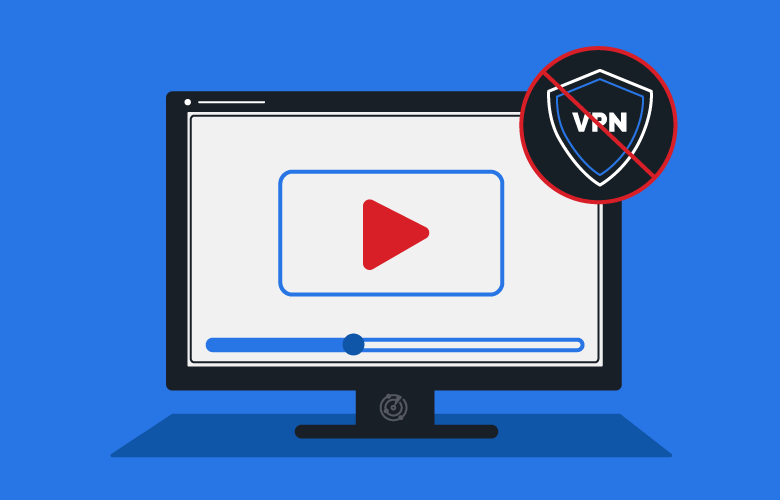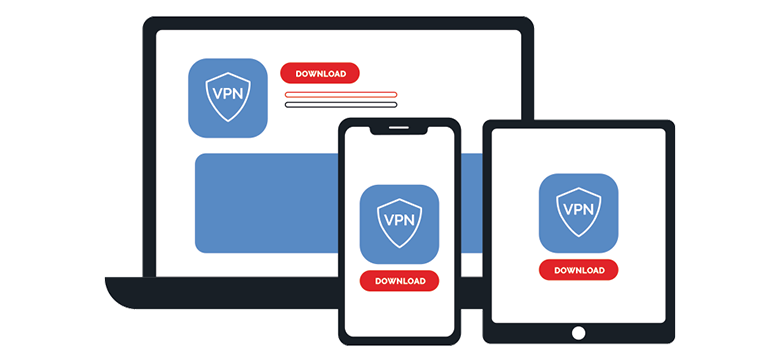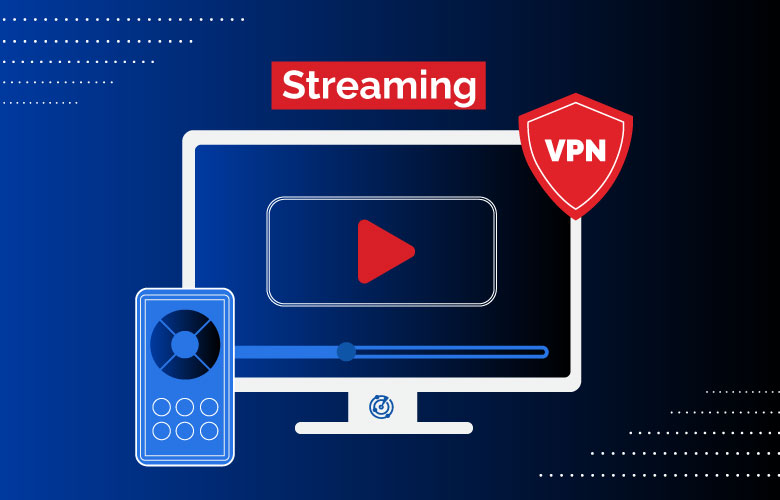March 3, 2022
How to Install IPVanish on Firestick
Not only is IPVanish known for its robust security features, but it also has fantastic reviews when [...]

WHAT’S IN THIS REVIEW?
Disclaimer: Partnerships & affiliate links help us create better content. Learn how.
It seems like there’s an eternal battle between streaming services and VPN providers, as they’re caught in a constant game of cat and mouse.
They’re currently stuck in a stalemate, as services like Netflix try their best to keep an army of online streamers at bay, often unsuccessfully. However, streaming platforms have managed to block a majority of free VPNs, and proxies are unlikely to work well for extended periods.
How and why do streaming services limit the use of VPNs, and what steps should you take in order to avoid choosing a blocked service? Here’s everything you need to know about using a VPN with a streaming service, and why they try their best to keep international users at arm’s length.

Before we get into the how, let’s discuss why streaming services block the use of VPNs.
Typically, it’s to enforce the international broadcasting deals they sign, the rights for which may be specific to a location or region. (In case you weren’t aware, some platforms offer different content depending on the country, while others only operate within a specific region.)
For example, the Netflix Terms of Use state:
“You may access the Netflix content primarily within the country in which you have established your account and only in geographic locations where we offer our service and have licensed such content. The content that may be available will vary by geographic location and will change from time to time.”
In other words, Netflix would appreciate it if you stick to the region in which you’re currently residing, as they probably don’t actually have the license to legally show you a lot of foreign content.
Switching to a VPN server masks your online movements, and will also assign the user with a new IP address. This can be used to make it appear as though you’re in a different country, unblocking many restricted websites and services.
Unblock your favorite TV shows and movies with a secure VPN.
Companies like Netflix have a legal obligation to stop users from accessing shows and movies if they haven’t paid a fee for the rights to broadcast it to them, as it would harm their relationship with partners if they allowed others’ content to be viewed freely.
Another example would be the BBC, which has a free-to-air app (iPlayer) available in the UK. They sell lots of content via the BBC Studios platform, and despite the challenges seen during the pandemic, they generated about $205 million in profit for 2020 to 2021.
They’ll lose out on significant revenue streams if international users are able to watch their content for free via the iPlayer app rather than with local partners who have paid for the broadcasting rights.
The problem is, regions like the US and the UK tend to have more content than others on platforms like Netflix, leading to a two-tier system. It’s frustrating to use a hamstrung service, especially if you know that other regions get much better value for the money.

I know it might sound hard to believe, but the majority of streaming apps and services were incredibly basic a decade ago. Forget encountering lag or bugs (which were commonplace; many had no form of anti-VPN software, and you could use a simple proxy to gain access.
Take streaming giant Netflix, which has morphed into one of the biggest entertainment services in the world. It was only released in 2007, or a couple of years after many of the early commercial VPN providers. It’s now a staple of everyday life, but it’s taken time to perfect the software.
I was reviewing VPN services in 2016, and even then, the majority of premium services were still able to unblock the likes of Netflix, BBC iPlayer, and Hulu with ease.
Around that time I did notice that many free services began to ask for an account, as well as an address in the country to try and limit the use of VPNs. For example, free UK streaming platforms like BBC iPlayer, 4OD and ITV never used to require login credentials, but had to find some way to stop international users from accessing their content.
You could input almost any physical address, so they decided to go one step further by banning the IP addresses associated with the VPN that was used to access their apps and websites. If the number of simultaneous connections coming from an IP address is abnormal, they’ll ban it directly. This doesn’t affect the end-user, but it makes the VPN server useless for accessing their content.
If the number of simultaneous connections coming from an IP address is abnormal, streaming services will ban it directly.
For example, Hulu started blocking users accessing the site from IP addresses linked to VPN services in April 2014.
Then in September of 2014, despite Netflix being blocked in Australia, it was estimated that there were anything from 20,000 to 200,000 subscribers within the region. They too began VPN blocking via IP inspection.
The BBC also did so in October 2015, with a spokesperson telling The Register:
“We regularly make updates to our technology to help prevent access to BBC iPlayer from outside the UK, which breaks our terms of use…BBC iPlayer is freely available to users across the UK without a VPN, and we also seek to ensure users of private VPNs such as those used by schools and companies in the UK have access.”
This signaled the end for many proxies and free VPN services, as the only way to circumvent a ban is to purchase more IP addresses, which is a costly endeavor. This means that the best method to access streaming sites with a VPN when facing issues is to reconnect to a new server, as you’ll be assigned with a different IP.
VPN usage exploded during the beginning of the pandemic, and streaming services can’t be happy that they’re missing out on significant revenue.
I wouldn’t be surprised if they begin to target VPNs more aggressively in the future, especially if they also offer live events like sports. (Think of DAZN, ESPN, or Amazon’s foray into Premier League soccer.)
In any case, they’re likely to keep their cards close to their chests for the time being, while the best VPNs will surely work on any counter-measures.
It feels like there is an endless battle between VPNs and streaming services, even if they’re relatively evenly matched in the present day.
In the beginning, it was open season for VPN providers, as every service seemed to be able to unblock almost anything with no hassle. Of course, this was way before streaming services had begun to perfect the current techniques used to protect their content.
Consider the example of HideMyAss (HMA), which was created in 2005 by a sixteen-year-old in just a few hours using open-source code.
Jack Cator wanted to circumvent restrictions when accessing games and music websites from his school network, forming the foundation of a business that was eventually acquired by AVG Technologies for $40 million with an additional $20 million earn-out if certain milestones were met in 2015.
The point is, the ability to access restricted content is one of the major selling points of a VPN and represents a significant portion of the user base for many providers.
To drive that point home, a 2021 study by Cornell found that “students are mostly concerned with access to content and privacy concerns were often secondary.” This sentiment is echoed by many users, so VPNs are obliged to try and access streaming sites unless they’re willing to pass up on a large chunk of change.
Streaming services have to try to block the use of VPNs, and they’re slowly getting better at it.
I could envision a time in which it’ll be almost impossible to access blocked content, perhaps in a more sanitized version of the internet that is yet to exist.
However, the best streaming VPNs are tenacious and are likely to deploy new methods to get past these restrictions as it’s a core part of their business model. That’s why it’s a constant game of cat and mouse, with no real winner aside from users who get to watch content that would otherwise be blocked or unavailable.
Ideally, streaming sites and services would be able to offer uniformity across all regions, so there would be no difference in terms of the shows and movies available to users. Why should it matter whether you’re in Canada or the United States?
Original content like Squid Game is one answer, but it’ll be tough to replace shows like The Office, or even licensed movies that stay popular. Expect the battle to rage on in the meantime.
WHAT’S IN THIS REVIEW?

Sign up with a secure VPN to access global movies, TV shows, and live sports.
| Cookie | Duration | Description |
|---|---|---|
| __cfduid | 1 month | The cookie is used by cdn services like CloudFlare to identify individual clients behind a shared IP address and apply security settings on a per-client basis. It does not correspond to any user ID in the web application and does not store any personally identifiable information. |
| cookielawinfo-checkbox-advertisement | 1 year | The cookie is set by GDPR cookie consent to record the user consent for the cookies in the category "Advertisement". |
| cookielawinfo-checkbox-analytics | 1 year | This cookies is set by GDPR Cookie Consent WordPress Plugin. The cookie is used to remember the user consent for the cookies under the category "Analytics". |
| cookielawinfo-checkbox-necessary | 1 year | This cookie is set by GDPR Cookie Consent plugin. The cookies is used to store the user consent for the cookies in the category "Necessary". |
| cookielawinfo-checkbox-non-necessary | 1 year | This cookie is set by GDPR Cookie Consent plugin. The cookies is used to store the user consent for the cookies in the category "Non-necessary". |
| cookielawinfo-checkbox-performance | 1 year | This cookie is set by GDPR Cookie Consent plugin. The cookie is used to store the user consent for the cookies in the category "Performance". |
| viewed_cookie_policy | 1 year | The cookie is set by the GDPR Cookie Consent plugin and is used to store whether or not user has consented to the use of cookies. It does not store any personal data. |
| Cookie | Duration | Description |
|---|---|---|
| cookielawinfo-checkbox-functional | 1 year | The cookie is set by GDPR cookie consent to record the user consent for the cookies in the category "Functional". |
| cookielawinfo-checkbox-others | 1 year | No description |